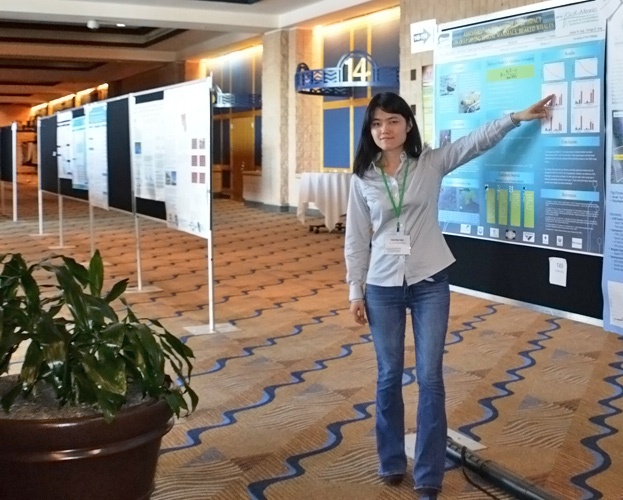Women and STEM Programs: How UL Lafayette is Changing the Future
Meet three women in mathematics at UL Lafayette. Math, like other sciences, tends to be a male-dominated field, but the math graduate programs at UL Lafayette are closing the gender gap. Read about their experiences, their research, and why opportunities in STEM for women is a priority at UL Lafayette.
Temi Gaudet, Math Doctoral Student
Temi Gaudet started out as a chemical engineering and math double major during her undergraduate career at UL Lafayette, and then declared math as her only major. Now, her research focuses on math biology, or using math to answer questions in biology.
She wasn’t discouraged from pursuing math because of her gender—she actually says she “hadn’t really noticed that it’s a male-dominated field.” Rather, she was discouraged from studying math because of the misconception that there aren’t any careers in math other than teaching.
“It took me awhile to realize that wasn’t true,” Temi says. “I actually spoke to one of the professors in the math department and he helped me realize this was completely untrue. It helped me be confident to be a math major.”
When she chose to pursue her Ph.D., she wanted to continue studying at UL Lafayette so she could work with the professors who helped her discover her passion for math biology. Now, she is working with Dr. Karyn Sutton on a dissertation that estimates the distribution of delays—the problems, pitfalls, and situations in which one can reliably do so.
“We’re looking at delay differential equations and we’re trying to estimate the distribution of a delay in the model,” Temi says. “Delays occur in biological systems when a natural time lag occurs. Basically, any biological process that has a time lag as inherent property, you want to add a delay to that model to get a more accurate prediction, because in real life, it doesn’t happen instantaneously—there’s a delay.”
The aim is to estimate the distribution of the delays in this model, which will help to make more accurate predictions in other models that involve delays. But it’s not just limited to applications in biology math—it has potential applications in physics, computer science, and engineering. More specifically, it has applications in neuroscience with modeling the delay in neurons firing in the brain.
Temi says she’s thankful to her professors, with whom she has worked closely and who also introduced her to their research colleagues across the country, including at the Gates Foundation. The opportunities in STEM for women are abundant, especially in research, which Temi plans to pursue after graduation.
Tingting Tang, Math Doctoral Student
Tingting Tang is working toward her Ph.D. in mathematics and plans to graduate in 2017. She says she’s had a love for math since she was a child; she’s always been drawn to the challenge of it, and the more she learns the more she loves about it.
 She says she was never discouraged from pursuing math, and she’s always had the support of family, friends and—most recently—her professors and advisor, Dr. Azmy Ackleh. From him, she says, “I learned that mathematics not only can be beautiful, but also so useful in solving the problems our society is facing these days.”
She says she was never discouraged from pursuing math, and she’s always had the support of family, friends and—most recently—her professors and advisor, Dr. Azmy Ackleh. From him, she says, “I learned that mathematics not only can be beautiful, but also so useful in solving the problems our society is facing these days.”
Tingting’s research is in response to the 2010 BP oil spill in the Gulf of Mexico and its potential effects on the whale populations and their habitats in the Gulf. As part of an interdisciplinary research team at UL Lafayette, she is collecting acoustic data from three specific areas in the Gulf of Mexico and helping to process the data to separate the signals produced by beaked whales from others. Then, she calculates the population level using a model they developed to estimate the population density from the acoustic signals. From there, she analyzes the results to understand the changes and impact on whale population levels.
With all of this data, she is developing mathematical models to predict the whale population dynamic in the future and to study how the population dynamic changes with regard to survivorship and birth rates. The aim is to understand what impact a large oil spill has on the whale population and to find the best strategy to help the whale population recover after this type of disaster.
So far, Tingting’s results show that if the survivorship of sperm whales is reduced by 10 percent for 10 years after an environmental disaster like an oil spill--and that it will take several hundred years for the whale population to reach its original level. Her results also show that increasing the survivorship of mature females leads to the most significant increase in population size, indicating that a potential strategy for helping the population recover is to focus efforts on helping the mature whale adults cope with and survive an environmental disaster.
“What I enjoy most about this work is the opportunity to use my expertise in developing complex mathematical models to contribute to this research,” she says. “I am hoping that the generality of the modeling approach we are using will prove useful for other problems populations and can be easily adapted to understand the impact of other future disasters on such marine mammal populations.”
Learn more about her research here.
For other women in mathematics, Tingting had this advice: “I would say endurance, persistence, creativity, and hard work will not fail you. Also, math is beautiful, a lot of fun, and is a very useful tool in many disciplines including sciences and engineering!”
Dr. Aghala Vatsala, Math Professor
Dr. Aghala Vatsala is an advocate for women in mathematics. She has been teaching at UL Lafayette for 30 years, mentoring students who she calls her “academic children.”
Half of the Ph.D. students Dr. Vatsala has directed are female, and she says she wants to help her female students forge a path for themselves in STEM.
“I grew up with the confidence that anything my brothers can do, I can do it, too,” she says. “This is what I tell my female students: that diligent and hard work with proper planning will help you succeed in your career and life. It is not easy but doable.”
Learn more about Dr. Vatsala and her work with students:
Learn more about graduate opportunities in STEM for women at UL Lafayette >
